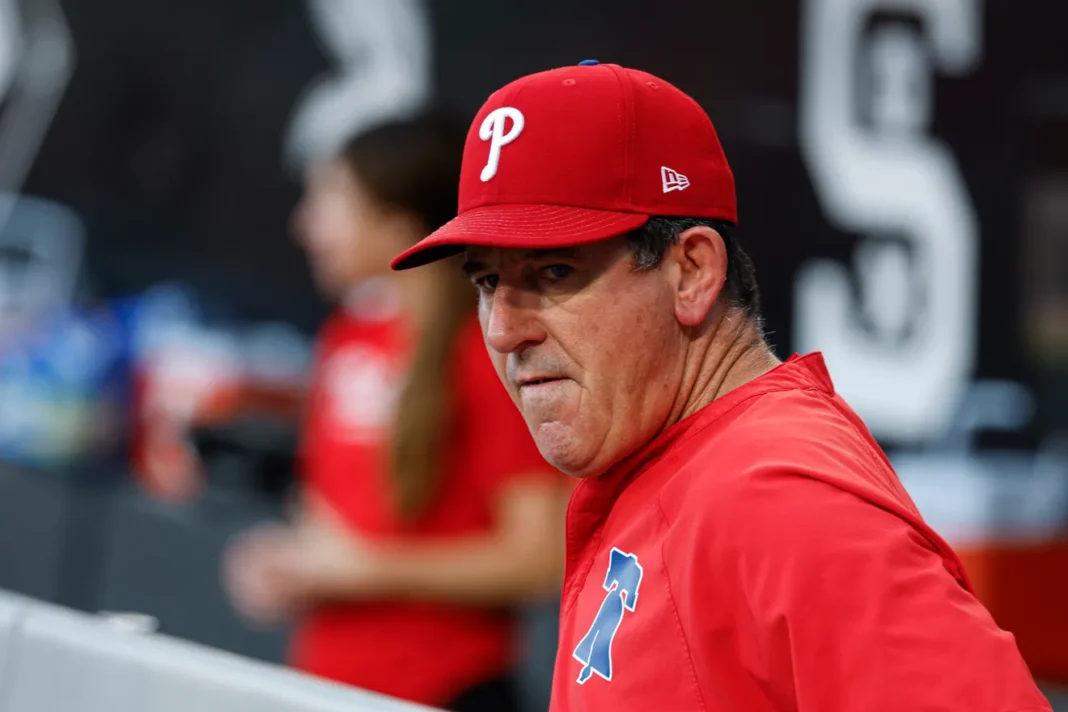It was already shaping up to be a long, miserable Wednesday for the Philadelphia Phillies. A one-hour rain delay pushed back the start of their series finale against the Cincinnati Reds, they were routed 8-0, and a quick turnaround loomed to get them to Washington for a four-game series against the Nationals.
By the time manager Rob Thomson settled into his seat aboard the team’s charter flight to Dulles International Airport, he expected to be airborne in minutes. Twice he dozed off, and twice he awoke thinking they had landed in the D.C. area. In reality, they hadn’t moved at all.
The Phillies were stuck on the tarmac in northern Kentucky for more than five hours as crews performed maintenance and repairs on their aircraft. As Wednesday night bled into Thursday morning, the order came that no traveler commercial or charter ever wants to hear: the flight was canceled.
In baseball, late-night postgame travel is a carefully choreographed routine designed to have players in bed at their next destination by the early morning hours. While the players rest, a separate truckload of uniforms, equipment, and supplies makes the same trip to arrive at the next ballpark overnight.
This time, the system unraveled.
“That’s baseball. These things happen sometimes,” Thomson said with a shrug. “You can’t control it, so you just keep moving forward. Really, the MVPs last night were Jameson Hall, Sean Bowers, and Michael Roche. They did a heck of a job taking care of us.”
Hall, the Phillies’ traveling secretary, Bowers, a clubhouse assistant, and Roche, the team’s manager of travel, sprang into action. With the players already checked out of their Cincinnati hotel, the trio managed to secure more than 50 rooms at a Marriott overlooking the Ohio River no small feat for a last-minute reservation in the middle of the night.
“It was actually pretty nice,” said Phillies closer Jordan Romano. “On the water, nice view. That was kind of cool. They were accommodating, getting 50, 60 people in there.”
While the team slept for a few hours in their temporary quarters, trouble still brewed in Washington. At Nationals Park, visiting clubhouse workers waited well past the estimated arrival time for the Phillies’ equipment truck before giving up and going home for the night.
The next morning, around 11 a.m., the Phillies learned a replacement plane was ready. By noon, they were back at the airport, and two hours later, they landed at Dulles, beating their gear to the ballpark.
When the truck finally arrived around 3:30 p.m., it was a mad dash to wash, dry, and distribute uniforms and equipment. Clubhouse workers scrambled to piece together player gear load by load. Some players had warm-up shirts ready while their game pants were still in the dryer.
To streamline things further, hotel room keys for the team’s D.C. accommodations were placed directly on chairs at each player’s locker. The actual check-in would wait until after their 6:45 p.m. game.
Major league players usually travel in comfort, avoiding most of the hassles that everyday travelers face. But as the Phillies learned, when things go wrong, even elite athletes are at the mercy of logistics, weather, and teamwork.
“They’re grinders already, working hard,” Romano said of the clubhouse staff as an attendant hung items in his locker. “And they’re grinding hard today.”
By first pitch, the Phillies’ uniforms were clean, their bats were in place, and the chaos of the past 24 hours had been contained all thanks to a coordinated effort from both the Phillies’ and Nationals’ staff.
It wasn’t the smoothest journey from Cincinnati to Washington, but for a team chasing wins, the most important part was that they were ready to play when the lights came on.


